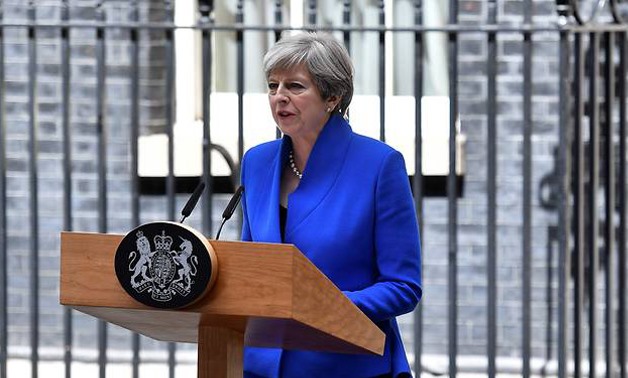
British Prime Minister and leader of the Conservative Party Theresa May delivers a statement outside 10 Downing Street after her audience with the Queen on Jun 9, 2017 - AFP/Ben Stansall
LONDON - 10 June 2017: Bloodied by an election gamble that backfired and triggered calls for her resignation, Prime Minister Theresa May on Friday stood by her vow to form Britain's next government and lead the country out of the European Union.
"What the country needs more than ever is certainty," the Conservative leader said, as a political crisis brewed around her.
Sterling plunged against the dollar and the euro as even more uncertainty fed into the complex Brexit process, and European leaders bluntly reminded May that the clock was ticking.
May, who became prime minister after the June 2016 referendum on leaving the EU, had called the election three years early in a bid to strengthen her hand in the looming Brexit negotiations.
But in a catastrophic setback, the bet failed and she lost her overall majority.
The center-right Conservatives found themselves eight short of the coveted 326-seat mark after the Labour Party, led by socialist stalwart Jeremy Corbyn, scored hefty gains.
May reached out to Northern Ireland's Democratic Unionist Party (DUP), which won 10 seats, to forge a working majority.
The Conservatives and the DUP, which is socially conservative and backs Brexit, are expected to work together on a vote-by-vote basis rather than enter a formal alliance.
May's top ministers, including finance minister Philip Hammond, foreign minister Boris Johnson and Brexit minister David Davis, will remain in their jobs.
In a statement outside Downing Street, the 60-year-old premier promised to "fulfil the promise of Brexit".
"It is clear that only the Conservative and Unionist Party has the legitimacy and ability to provide that," she claimed. "This will allow us to come together as a country and channel our energies towards a successful Brexit deal."
But European Council President Donald Tusk warned there was "no time to lose" in starting the negotiations.
European Commission chief Jean-Claude Juncker added he hoped there would not be "further delay" in the talks that "we are desperately waiting for".
May confirmed she intended to start the Brexit talks on June 19 as planned, promising to "get to work".
She launched the two-year countdown to Britain's exit from the EU on March 29 before announcing snap elections less than three weeks later, causing precious haggling time to be lost.
Diplomatic veterans say the Brexit process is as titanic in scale as it is historically unprecedented.
It requires the unwinding of a four-decade relationship with Europe -- with the risk that Britain, without a deal, could find itself locked out of the lucrative single EU market.
Tusk spelt out the problem on Twitter: "We don't know when Brexit talks start. We know when they must end. Do your best to avoid a 'no deal' as result of 'no negotiations'."
EU budget commissioner Guenther Oettinger said May was now likely to be a "weak" partner.
"The British need to negotiate their exit but with a weak negotiating partner, there is a danger that the talks are bad for both parties," he told German radio.
May was deemed on track for an overall majority in the triple digits when she announced the elections on April 18.
But she came under fire for a lacklustre, soundbite-driven performance on the campaign trail and a damaging U-turn on healthcare policy.
Both were skilfully exploited by Corbyn, who also found the upper hand after two terror attacks threw the spotlight on May's record in her former job as interior minister.
The vicar's daughter presented herself as a "strong and stable leader" but is now facing calls to resign after throwing away her party's majority.
Corbyn bitingly told May to quit, saying she had "lost votes, lost support and lost confidence".
"I don't believe personally that Theresa May will remain as our prime minister indefinitely," said Conservative lawmaker Heidi Allen.
"In my view it may well just be a period of transition," she told LBC radio.
Former Conservative minister Anna Soubry added that the premier "is in a very difficult place... she now has to obviously consider her position".
"Mayhem" screamed the headline on the front page of The Sun, Britain's biggest selling newspaper, which normally backs the Conservatives.
The London Evening Standard, edited by former finance minister George Osborne who was sacked by May, splashed with a photo of her under the headline "Queen of Denial".


Comments
Leave a Comment